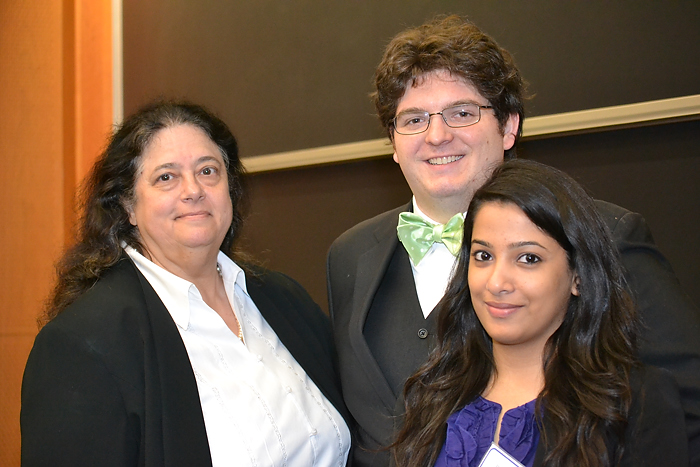
For 30 years, UConn Health Center biomedical students have been showcasing their work during Graduate Student Research Day each June. This year’s event, held Thursday, was especially significant because the woman who founded the annual tradition back in 1983 was the Alumni Speaker.
Pamela Marino graduated from UConn Storrs in 1973 and after working at Yale for several years, she returned to UConn to complete her doctoral studies at the Health Center under the mentorship of Mary Jane Osborn.
After two years, she became president of the Graduate Student Organization and soon realized the need for an event that would increase the visibility of the graduate program and shine a light on students’ accomplishments.
Marino worked her connections and found the funds to put together the first Graduate Student Research Day and it proved such a success, it has become a yearly event.
“And this is the 30th now, so I thought it was important to come back,” says Marino.
Marino left the Health Center in 1986 and has spent most of her career at the National Institute of General Medical Sciences (NIGMS) at the National Institutes of Health (NIH). She currently handles the institute’s Glycobiology and Molecular Immunology portfolios, and directs the NIGMS intramural program.
During her presentation, Marino talked about her “journey” from UConn to the NIH. She also gave some background into the inner-workings of the federal agency and what the students need to know when they apply for grants.
Marino credits much of her success to the education and training she received at UConn.

“This is a fantastic facility and the people here are top flight,” explains Marino. “I knew I wanted to move into science administration because I worked for Mary Jane Osborn. Seeing what she did was really inspiring and helped shape where I wanted to go. The mentorship and the training I got here was instrumental in getting me to where I am now.
Research Day also included a keynote address by Thomas Steitz, Sterling Professor of Molecular Biophysics and Biochemistry at Yale University and the winner of the 2009 Nobel Prize in Chemistry; and a presentation by Sonali Ghosh, a Ph.D. student in the Molecular, Biology and Biochemistry Program and last year’s Lepow Award winner.
Several awards were announced at the daylong event, including:
David Drew received the 2013 Lepow Award. Established in 1986 in honor of Irwin H. Lepow, a well-known faculty member, researcher and founding father of the Health Center, this award is given to support the outstanding fourth-year student in the biomedical science Ph.D. program. Drew is in the Center for Molecular Medicine and is working in Daniel Rosenberg’s laboratory on a project asking whether aberrant crypt foci (ACF) of the human colorectum are surrogate markers for colorectal cancer prevention. ACF are the earliest endoscopically-detectable lesions and may develop into adenomas or polyps, which are known precursors to malignant cancers. Through a large human clinical study run through UConn Health’s Colon Cancer Prevention Program, they screen patients for ACF and biopsy them during colonoscopy. Drew says, “The study has translational significance as our findings may warrant the inclusion of identifying diminutive lesions during colonoscopy to shape clinical recommendations regarding screening intervals for patients.”

Stormy Chamberlain, assistant professor of genetics and developmental biology, was selected as the 2013 recipient of the Osborn Award for Excellence in Biomedical Science Graduate Teaching. The award honors the many important contributions to graduate education by Mary Jane Osborn, past chair of the Department of Microbiology, member of the National Academy of Sciences, and currently professor emeritus at the Health Center. The intention of this award is to recognize a Health Center graduate school faculty member for his or her commitment to providing the best education in the classroom and training in the laboratory.
Tiziana Franceschetti, graduate assistant in the Department of Skeletal, Craniofacial and Oral Biology, is the recipient of the Lawrence G. Raisz Award for Excellence in Musculoskeletal Research. This is the first year the award was given in honor of Dr. Raisz, a Board of Trustees Distinguished Professor of Medicine who died in 2010. Raisz was one of the world’s experts in the field of musculoskeletal research and he influenced the careers of countless students, scientists and clinicians.
Franceschetti also won the Oral Presentation Award in which she competed against other students in the seven areas of concentration in the biomedical science Ph.D. program.

The poster session included 29 presenters with more than a dozen faculty members serving as judges. The posters are judged on several criteria including the scientific material being presented, how well founded the hypothesis is, and whether it is a scientifically reasonable project. The student is also judged on the graphics and layout of the poster as well as how well the student presents the material and answers questions.
Barbara Kream, associate dean of the graduate school, says the research day’s poster session offers valuable experience for students. Because there are only a certain number of slots for oral presentations at national meetings, poster presentations are becoming a more common and popular way of communicating your research to others in your field.
Poster presentation winners:
1st Place: Rene Norman, Department of Cell Analysis and Modeling
2nd Place: Kyle Denton, Department of Neuroscience
3rd Place (tie): Ryan Rogers, Department of Genetics and Developmental Biology and Spenser Smith, Department of Skeletal, Craniofacial and Oral Biology
Follow the UConn Health Center on Facebook, Twitter and YouTube.



